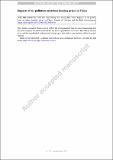Impacts of air pollution on urban housing prices in China
Author(s)
Ou, Yifu; Zheng, Siqi; Nam, Kyung-Min
Download10901_2021_9845_ReferencePDF.pdf (1.210Mb)
Open Access Policy
Open Access Policy
Creative Commons Attribution-Noncommercial-Share Alike
Terms of use
Metadata
Show full item recordAbstract
Abstract
In this study, we examine pollution effects on urban housing prices in China, using a fixed effects 2SLS model on a 13-year (2005–2017) panel dataset of 237 prefecture-level cities. We find that urban housing prices are negatively associated with PM2.5 levels, presenting an elasticity of – 0.32 for the entire sample. In large cities with an urban population of ≥ 5 million, the elasticity further increases in absolute value to – 0.34, reflecting greater marginal benefit associated with a unit percentage PM2.5 reduction in a higher pollution band. In addition, PM2.5’s effects on housing markets present temporal variations, and the base elasticity of – 0.29 for earlier periods increases to – 0.33 in the post-2008 period, reflecting increased public awareness of pollution-caused health risk after the Beijing Olympic Games. In the post-2014 period, however, the elasticity declines to – 0.24 with stricter pollution regulations introduced in late 2013 as part of the 12th Five Year Plan. Rational expectations regarding continued air-quality improvement in the future may underlie this trend.
Date issued
2021-06-10Department
Massachusetts Institute of Technology. Department of Urban Studies and PlanningPublisher
Springer Netherlands
Citation
Ou, Yifu, Zheng, Siqi and Nam, Kyung-Min. 2021. "Impacts of air pollution on urban housing prices in China."
Version: Author's final manuscript